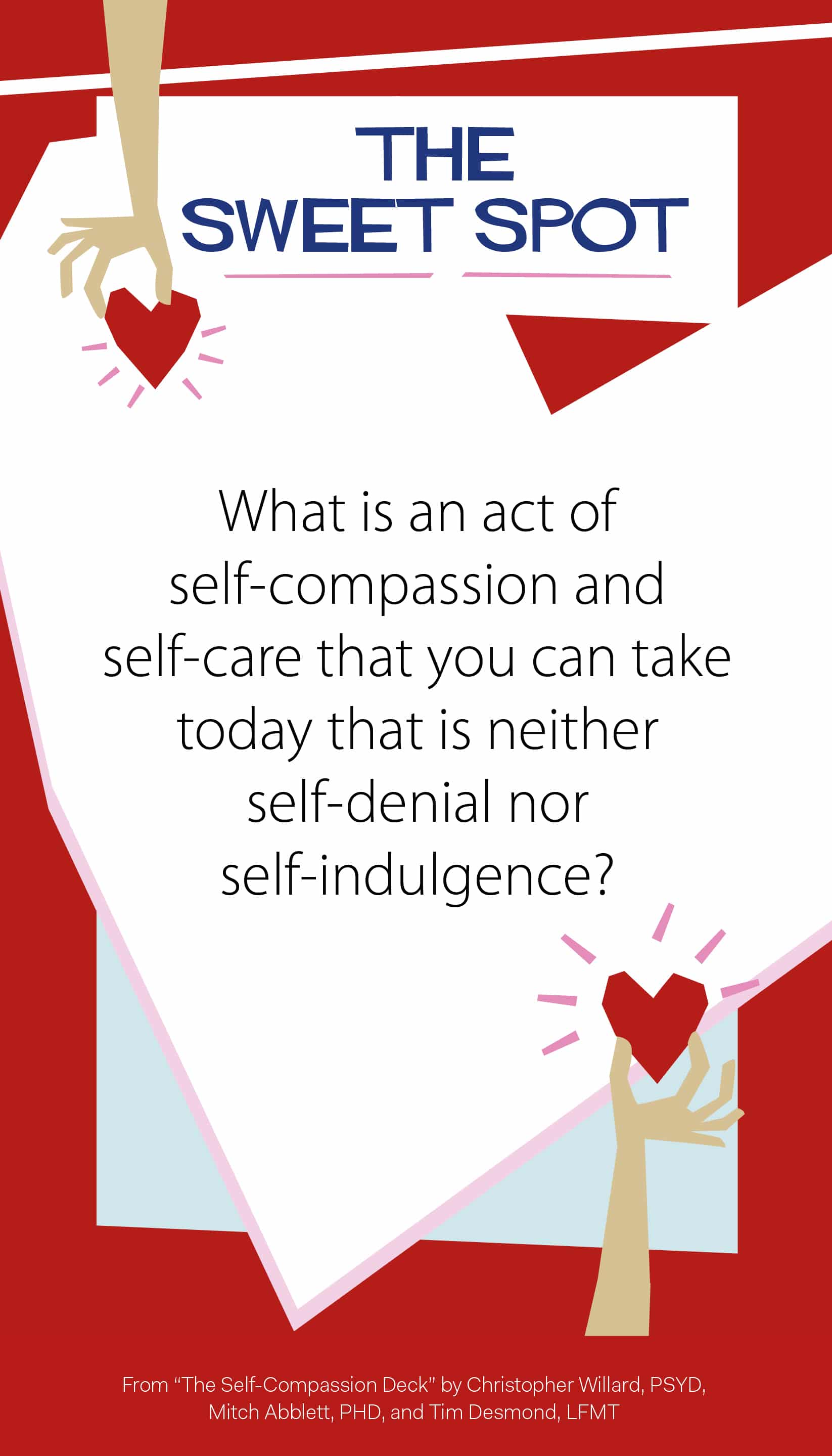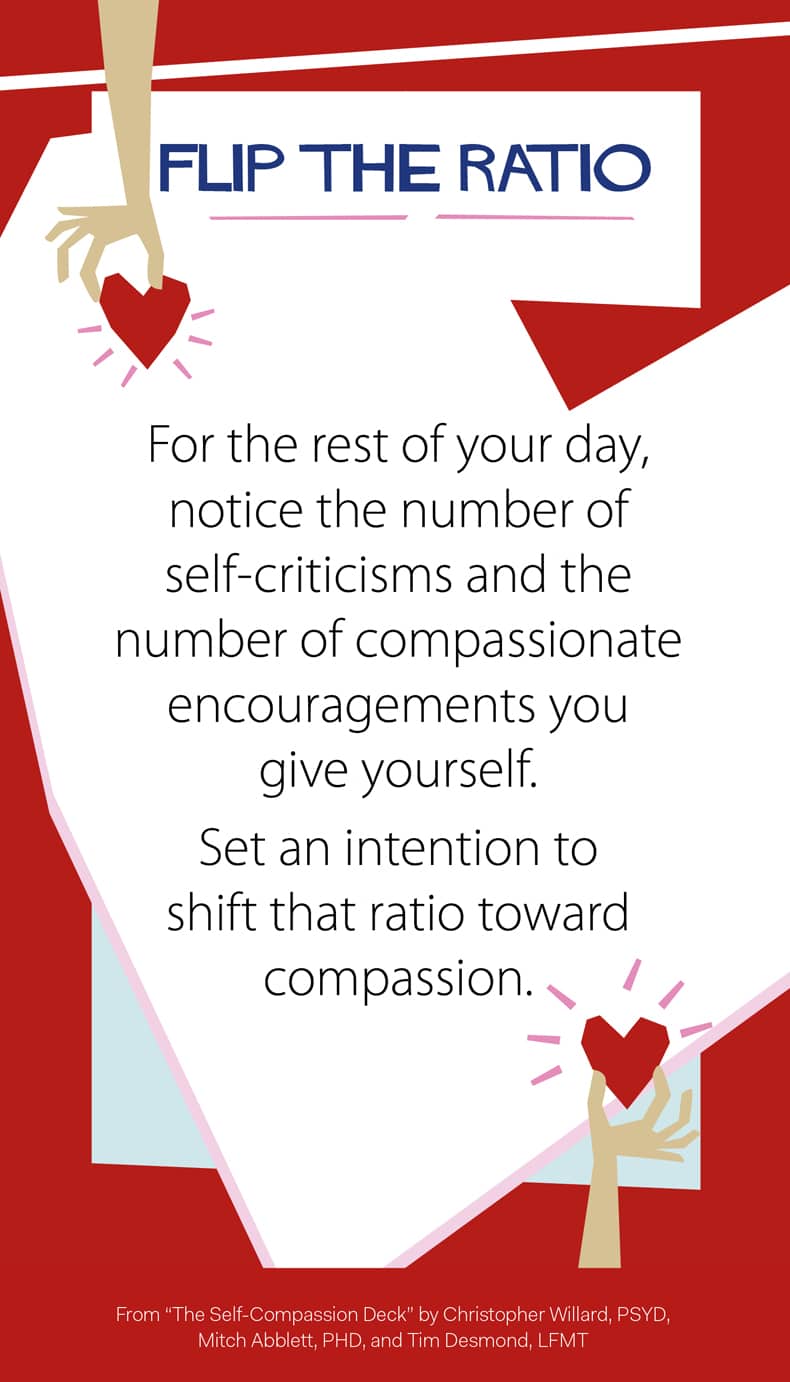[ad_1]
Once we’re caught up within the rush to create the proper vacation expertise, exhibiting ourselves a bit of self-compassion really helps us present up for others.
‘Tis the season for self-judgment! Throughout the holidays, the evaluating thoughts kicks into excessive gear as we measure ourselves towards our buddies, household, colleagues, in addition to the “ghosts” of previous and future visions of ourselves and discover that we’re arising brief. In Charles Dickens’ well-known Christmas Carol, the stodgy and stingy Ebenezer Scrooge learns to embrace gratitude and attunement for these round him. How about we take a web page from Dickens’ ebook and never solely attune to others this vacation season, however accomplish that towards ourselves as effectively.
As a clinician, I’ve been educated to identify and tackle the unhealthy psychological behavior of repetitive and negatively-toned inner chatter that broils in our minds and our bodies from the within. Rumination (or repetitive and passive desirous about unfavourable feelings) has been shown to foretell the continual nature of depressive problems in addition to nervousness signs. One other study instructed that individuals with a ruminative fashion of reacting to their low moods have been extra more likely to later present increased ranges of melancholy signs. Once we ruminate about our shortcomings and failings, we spend an excessive amount of time in our heads as an alternative of residing our lives. We deal with berating ourselves internally as an alternative of truly having fun with the vacation.
Once we ruminate about our shortcomings, we spend an excessive amount of time in our heads as an alternative of residing our lives. We deal with berating ourselves internally as an alternative of truly having fun with the vacation.
And it’s not simply my sufferers who ruminate negatively about themselves—it may very well be me, as an example, telling myself time and again that I’m an “absolute failure” as a therapist for not listening to a affected person for a break up second throughout a session. Or eviscerating a future model of myself primarily based on a minor fake pas final week. Rumination is the run-on self-talk of the thoughts that has agitated power as each its gasoline and its output. Ruminative pondering is poisonous to our well-being and readability of thoughts.
So how can we work with rumination? A method ahead is self-compassion. Self-compassion is way over chasing rainbows and skipping after unicorns. In accordance with psychologist and researcher Kristin Neff, self-compassion is self-kindness (versus self-judgment), mixed with a way of widespread humanity (versus being alone with what’s exhausting) and mindfulness (versus being over-identified with dangerous emotions). Self-compassion is seeing our ache as a part of the bigger, common image of being human, and seeing ourselves as worthy of kindness and care. And it’s not weak or passive, or narcissistic and self-indulgent. It takes guts to apply, and science reveals that it might probably do a lot to decrease nervousness, stress reactions, melancholy, and perfectionism. It might probably open you as much as your life whereas your previous patterns or response and self-judgment shut you down.
In a 2010 study analyzing the degrees of reported self-compassion, rumination, fear, nervousness, and melancholy in 271 non-clinical undergraduate college students, outcomes instructed that individuals with increased ranges of reported self-compassion are much less more likely to report melancholy and nervousness. The info confirmed that self-compassion could play the position of buffering the results of rumination. In a number of the practices that comply with, we discover ways to unhook from rumination and minimize ourselves (and others) the slack requisite for rising readability and ease of being.
Sidestep Self-Judgement: Three Aware Practices for Self-Compassion
The next transient self-compassion practices are drawn from my co-authored card deck (together with clinicians and authors Chris Willard and Tim Desmond) “The Self-Compassion Deck” (PESI Publishing & Media). What follows are three playing cards from our deck specified by a sequence that’s meant that will help you sidestep the self-judgment/ ruminative cascade and construct a basis of self-compassionate, versatile area—one thing a lot wanted this time of 12 months!
As with many mindfulness practices, this one is greatest performed in a quiet area, together with your physique in a cushty, alert posture. Absorb just a few sluggish, deep breaths after which learn these three playing cards so as. Pause for 30 seconds or extra with every card.
Watch what arises in your physique and thoughts as you come to relaxation on the phrases (and underlying which means) of every apply. Simply enable your self to look at what reveals up, and in case your thoughts goes into its loops of rumination, simply gently come again to the cardboard and its self-compassionate intentions.
1) Ship sort needs to your previous and current self
Pause and absorb what emerges for you about giving sort needs to your self at numerous phases of your life. At what factors in your life is it simpler/ more durable to conjure self-kindness?
2) Select an act of self-care

Discover what concepts present up while you consider what may do to legitimately maintain your self immediately. Does your ruminating thoughts instantly throw up any roadblocks? Any “effectively, however’s …”? Are you prepared to “thank” your thoughts for sharing these, and do the self-compassionate act anyway?
3) Preserve observe of how typically you criticize your self vs. encourage your self

Maybe your self-compassionate act for immediately could be to truly do what this final card suggests—hold observe of how typically you criticize versus encourage your self. I’m severe: maybe you possibly can hold observe with tally marks on a scrap of paper or on a journal. Being sincere and prepared to concentrate this carefully to your self is itself an incredible act of self-compassion. We don’t typically give ourselves this a lot day trip of our busy lives. As a substitute of all of the tally marks on vacation to-do lists, maybe we are able to tally up our relationship with ourselves?
[ad_2]
Source link

